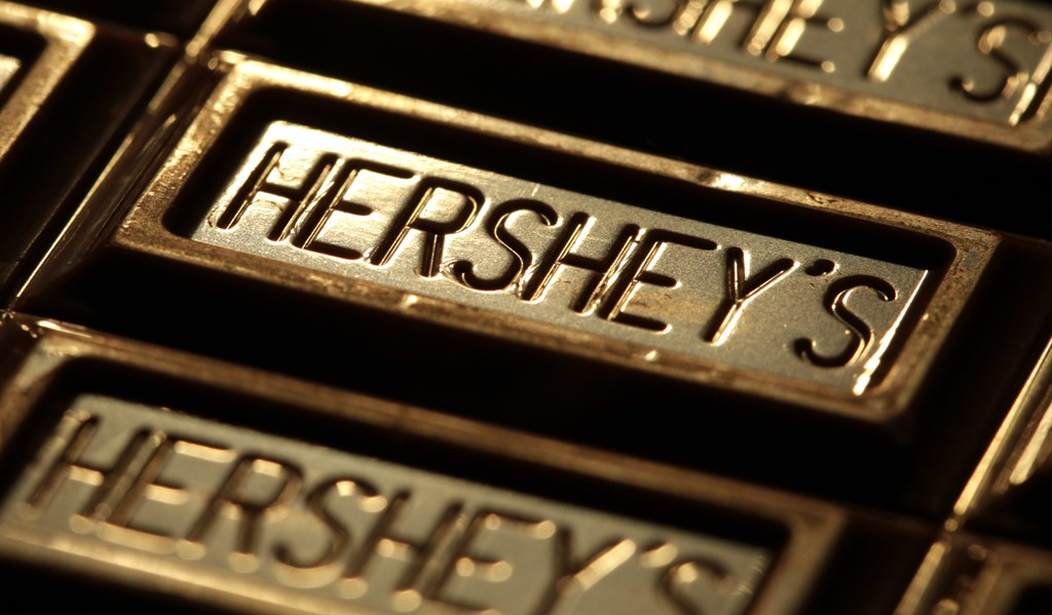During prepared remarks about second-quarter results, Hershey CEO Michele Buck warned the company would not be able to meet the demand for the October holiday. Your favorite chocolate Halloween candy is going the way of the Choco Taco as producers look to shed less popular offerings amid continued supply chain shortages.
Of course, CNN says this is all the consumers’ fault. According to their write-up, you fatties started gorging on sweets during the pandemic, gobbling up supply. The network also seems to believe that enthusiasm for Halloween last year, after over a year of lockdowns in many areas of the country, generally signals some new and increased interest in Halloween. Because it is well known that kids have not enjoyed holding out a bag and receiving free candy until now:
Demand for sweets surged during the pandemic and has remained high. Meanwhile interest in Halloween has only gotten stronger. That’s bittersweet news for Hershey, which has seen its sales spike — the company reported double-digit sales growth in the quarter compared to last year -— but it has also had to make some production sacrifices.
The chocolate maker uses the same manufacturing lines for its regular and seasonal products. That means it can’t amp up production of both regular sweets and Halloween or holiday items. Instead, it has to do one or the other.
Buck said the company had a strategy of prioritizing everyday products on the shelf. This decision may mean you can be the hero in your neighborhood and hand out the full-size Reese’s Peanut Butter Cups. There is one in every community, and that could be you this year.
Related: Sri Lanka Is the Future the Global Elites Want for Everyone
Buck also said Hershey’s issues are primarily due to the war in Ukraine. If chocolate bars were made of wheat, I could buy that. Russia and Ukraine combined produce over one-quarter of global wheat exports. I could concede a Kit Kat and Twix shortage because of their crunchy cookie components. But not full-scale chocolate production.
Even a blog trying to explain the impact of the war in Ukraine on chocolate could only come up with the increasing cost of cocoa beans and the price of oil and gas. The former predates the current conflict, and the latter affects every industry.
In reality, there are two major chocolate producers. One is Cargill, an American company. The even larger one is Barry Callebaut in Switzerland. Together these companies process more than 60% of the world’s cocoa. Big companies like Hershey most often buy from these two suppliers. They are large and dependable, usually.
According to Cargill’s website, they have a sales office in Ukraine. Barry Callebaut lists no locations in Ukraine. The company did have three manufacturing locations in Russia, where the company suspended operations, but the entire country supplied only 4.9% of global chocolate exports as of July 2022. Kazakhstan and China consume the highest percentage of Russia’s chocolate exports.
What actually appears to be happening is similar to what happened with baby formula in this country. One Abbott plant getting shuttered for a health issue crippled supply to the point that retailers rationed the product when parents could find the formulation their baby required. Searches for homemade formulas went through the roof, and social media sites started censoring the information for “safety” reasons. The supply chain for baby formula in the United States is so consolidated that one plant can take down supply.
Related: Do Not Let Food Be the Next Shortage Biden Tries to Pin on Putin
On June 30, the biggest chocolate factory in the world shut down after discovering salmonella in a production batch. The Weize, Belgium, plant is run by the largest global producer of chocolate, Barry Callebaut. In addition to shutting down production, the company recalled all products manufactured after the test date. Barry Callebaut announced it would restart production early this month in Weize. It will take several weeks to ramp up to full production.
This plant closure leaves a hole in the global chocolate supply, leading to Buck’s comment about finding new sources. How Putin is responsible for salmonella in a plant in Belgium is unclear. However, the lack of Halloween candy is an object lesson to add to the one the formula shortage provided.
Our leaders have no idea how razor-thin the supply chain is in many industries. One hiccup, such as a single major plant closure for a critical input for a finished product, can bring down supply domestically or globally, depending on the industry. Yet our elite “experts” believe they are qualified to regulate the food supply and the supply of other critical inputs. Perhaps that is the real reason President Biden warned of possible food shortages. The elites actually have no idea what they are doing.
You can’t make a Reese’s Peanut Butter Cup without chocolate. And it looks like Hershey won’t be making the Halloween size for that product or any other one. Be the hero. Buy the full size.










Join the conversation as a VIP Member